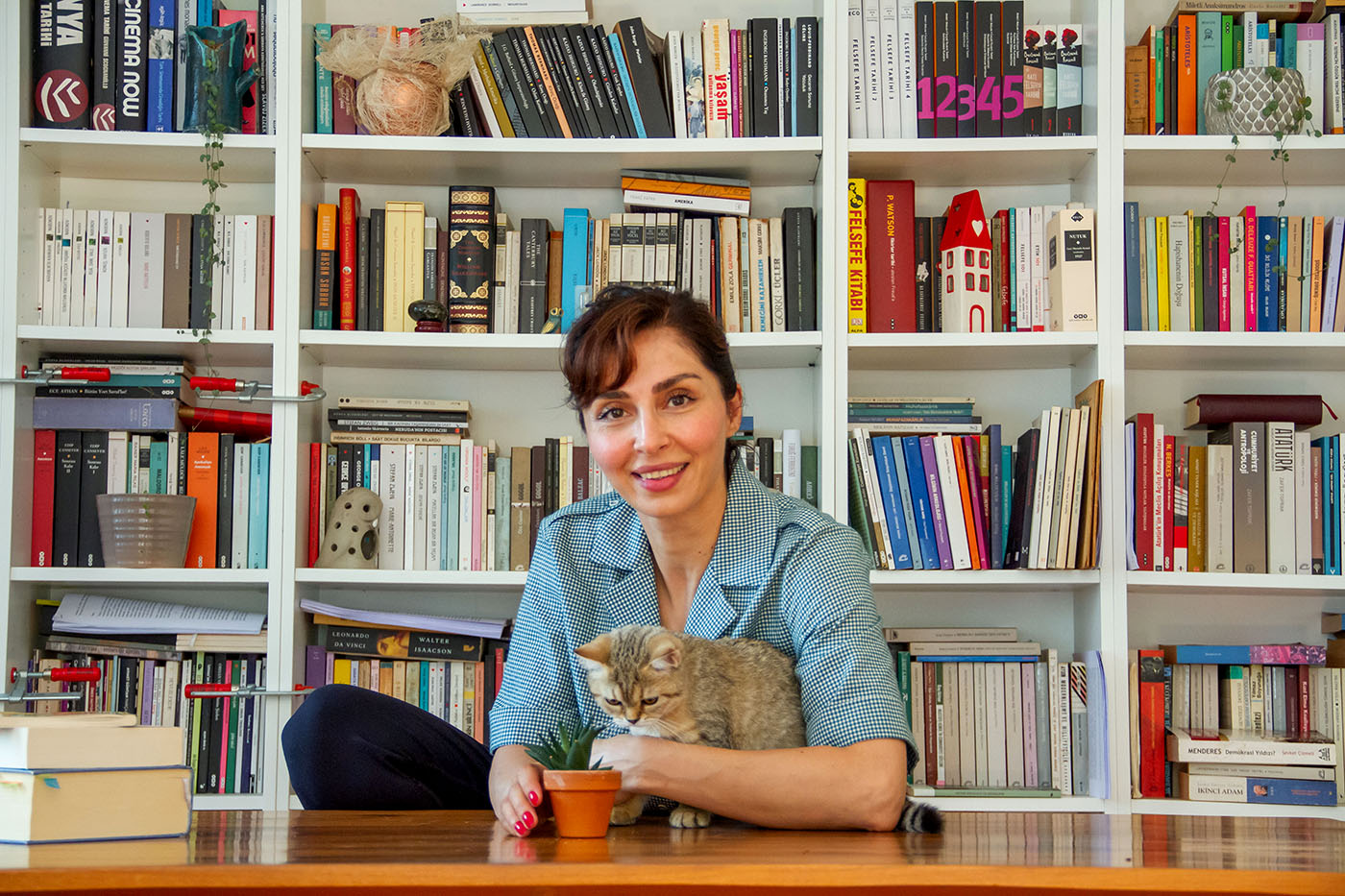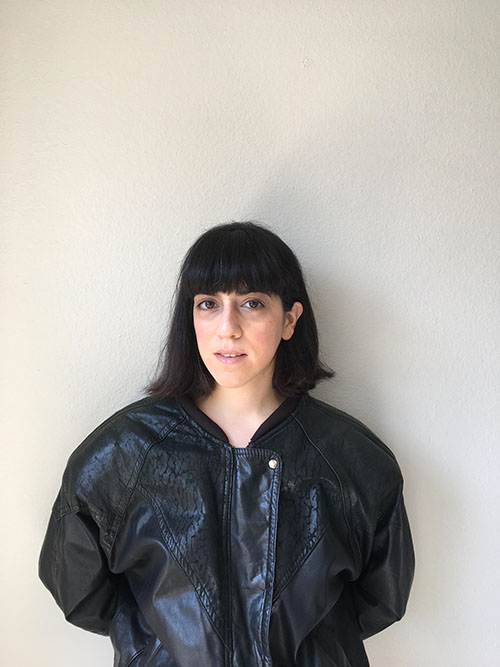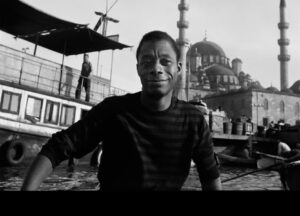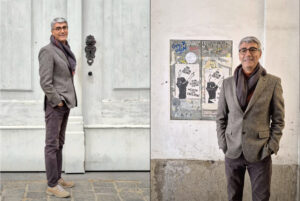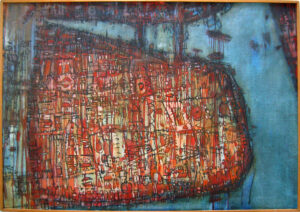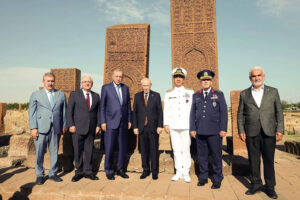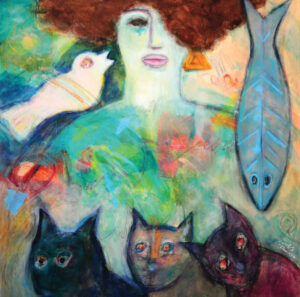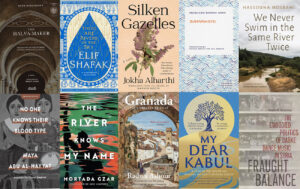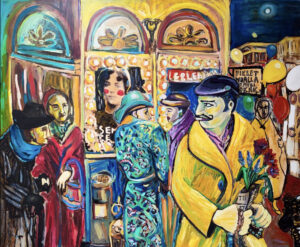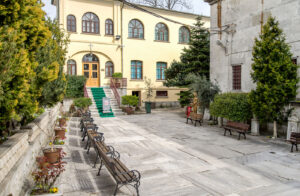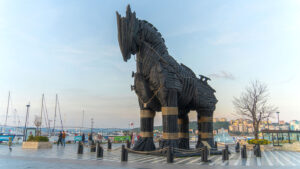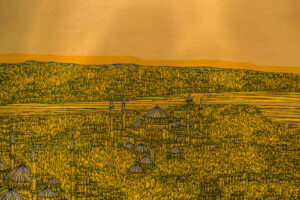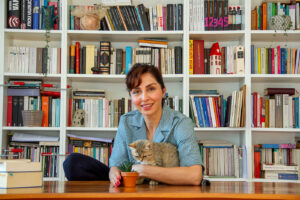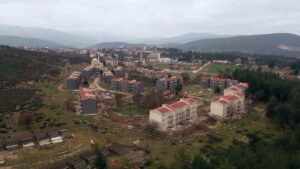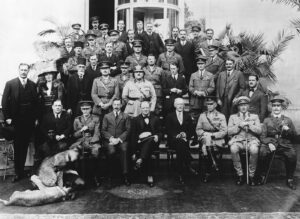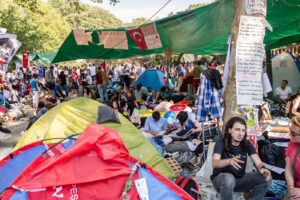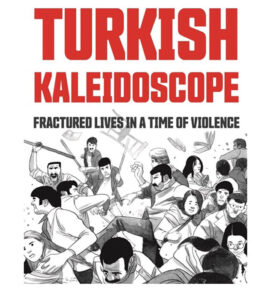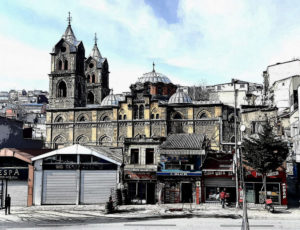This is a conversation in translation and on translation, centered on the novel Lojman by Ebru Ojen. Originally written in Turkish, Lojman has now been translated into English by Aron Aji and Selin Gökçesu and published by City Lights (2023).
The word lojman indicates institutional housing in Turkish, by way of French. Ojen’s novel recounts the story of a family stuck in a public school lojman for teachers. Sent there by the state, abandoned by their patriarch, the women in the story challenge all the meanings assigned to the nature of womanhood, childhood, and manhood by the languages that have constructed them.
I dialogued with the author of the text, Ebru Ojen, as well as the translators, Aron Aji and Selin Gökçesu. All of us are multilingual writers and translators. Ojen grew up in a bilingual Kurdish household in Turkey and now lives in Istanbul. Aji, Gökçesu, and I all left Turkey as adults and have been living in the US for many years.
Our conversation began in Turkish, on three different email threads. I translated most of it into English, though over the course of three months, many of our words had already found their own way into English.
NAZLI KOCA: Lojman is a compelling and excruciating dissection of family as a house to which we’re sentenced to love. What do you think about literary lineages, ancestors, and traditions? Does Lojman have a literary family?
EBRU OJEN: Concepts like lineage, family, vein, and canon in literature together encompass a tangible reality. The canon in particular is deeply regulated by the government in Turkey. From the first phases of the republic, books in line with the regime’s ideology were featured in school curricula and placed in libraries, while many books by authors who opposed the regime were banned. These prohibitions continue to be in place today.
The literary family/family tree are concepts that have been shaped a little more independently but are still guided by those who have influence over literature. Literary authorities always like to categorize authors and their works within certain traditions.
As for me, I don’t feel that I belong to any literary tradition, canon, or lineage. There are writers and poets I love, books that I take great pleasure in reading, but I don’t belong to any literary lineage in the way you gesture. I’d say my literature is independent of all literary lineages — an illegitimate literature.
However, having grown up as a witness to the Dengbej music tradition, I do think that the traditions of oral narrative, improvised poetry, and music in my family were the major influences on my writing. My relatives — storytellers, poets, and musicians — would travel to villages, stay in people’s homes, play bağlama, and recite their improvised stories to music.
So, as a child, I fortuitously got to perceive the world through music, poetry, and stories. Growing up surrounded by all these has fed my literary work, though I diverge from my family’s oral narrative tradition by scribing what I want to tell, and I write stories that are very different from those that were told to me.
NK: A couple of articles I’ve read in Turkish suggest that the writing style in your novels reflects the fact that you learned Kurdish and Turkish at the same time. Do you agree with this observation? Are there any moments in Lojman where this synthesis comes forward or carries special importance for you?
EO: While working on my novels, I’ve never felt the need to limit myself in terms of language, but from my very first book I’ve paid particular attention to the music and rhythm of the language. When readers identify a sense of bilingualism in my work, to me it means that they too are intimate with the music of language. We connect with language almost instinctively. I think this is the thing that first sparks our relationship with literature and language.
This bilingual effect might be somehow revealing itself when the story, atmosphere, and language come together. After all, I must inevitably be carrying the effects of growing up in a bilingual family into my novels.
I’ve had a strange relationship with language since childhood — being reprimanded and forced to speak “clean” Turkish in school or in certain social circles must have developed a resistance in me. Over the years, the matter of language became a scuffle of sorts, especially when it came to literature. With each of my novels I felt an increasing need to think about language. I felt it musically rather than conceptually. Like encountering a flower while out in nature. I believe that our encounters with the natural world and with language in literary texts have similar effects on us. When the author is able to communicate with immediacy and the reader feels this direct interaction, the text turns into literature through the language itself. This is, above all, an exciting adventure.
NK: If you, Ebru Ojen, found yourself inside Lojman with the characters you created, what would you say to them, what would you like to ask them?
EO: I passed my childhood years in a lojman in Van. Though my family is very different from the one in the novel, I’ve closely experienced what it’s like to live in a lojman. I see a lojman as more than a place to live. To me it’s an instrument of government, a legislator of sorts. As such, it seems inevitable that it would affect the people living in it both mentally and physically. If a lojman is an instrument of government, and if we’re inexorably transfigured by the lojman’s tyrannical intelligence that legitimizes itself through us, then, living there, our subjectivity is inevitably constructed by the government’s interventions on the lojman. And if one’s subjectivity has been shaped by the lojman for long enough, then any question we could ask the characters in the novel would emerge from a subjectivity constructed by the government. Meaning that any question we may pose to the characters in the novel would be answered by the voice of the lojman itself, because such structures are not as innocent as they seem from the outside. From the outside, it might look to you like a cute school residence, but everything in the lojman is predetermined. Everything, including our answers, was set in stone from the very first moment its foundations were laid.
So, the characters in my novel are, in a way, mute, and asking them questions is futile since they can’t answer in their own voices. Their constructed subjectivity can only be challenged once they leave the lojman. And the same is true for us in daily life. We begin to ask questions and find answers only when we step away from the instruments of power. We then feel the need to start questioning how we position ourselves, and our constructed subjectivity transforms into an art of resistance.
Kurdish Novel Explores Nightmarish Isolation in Eastern Anatolia
NK: Aron, I turn the questions to you now. How and why did you decide to keep the Turkish title, Lojman as it is, in English? What effect were you hoping for?
ARON AJI: I decided that the title should remain Lojman in English as soon as I read it. I thought Ojen chose this title consciously and intentionally. Despite its common usage, the word lojman has always stayed estranged in Turkish. It feels as though both the speaker and the hearer of the word sense its foreignness and othering associations. Lojman is an othering defeat, a defeating foreignness. An emotion ingrained between and within the main characters in the novel. In this respect, the lojman is the main character of the book. That English language readers feel a similar foreignness in their first encounter with the book is an important entry point into it.
It’s also a word that contains the letter “j,” a sound that’s always been foreign to the West, one that orientalists could never tame. One that creates a provocative uneasiness and curiosity.
NK: You translated Lojman into English with Selin Gökçesu. What are the rewards and challenges of working with a co-translator? How did this partnership affect you and the translation itself?
AA: Translation is in all cases a dialogue between the text and the translator. The transfer of a text from one language to another is ultimately a dialogue as well. It’s a process of two languages reading and understanding one another, unweaving and re-weaving the fabric of content-style-form, recreating it. Translation is also an art of reading/decoding. For all these reasons, I believe polyphony suits the nature of translation. The linguistic and formal consistency that texts in translation take on in their final instance is in fact the result of the transformation of this polyphony into an aesthetic harmony. And it is exactly on these grounds that working with a co-translator becomes appealing to me: reaching transparency in both the pursuit and method of translation through the interaction that occurs between two translators.
Working with Selin Gökçesu was a very pleasant and fruitful experience. One of the main themes of the book is womanhood, the disintegration of female identity and gender in the clutch of society and tradition, and how it can take on a destructive, self-destructive toxicity. The dialogue between Selin and I was crucial in allowing us to transpose this theme with sensitivity. We decided that she’d first translate the whole text on her own in order to ensure that her interpretations of character psychology and language would be central to our collaborative work. So, that initial draft text became the guideline for not only our dialogue on the translation, but the decisions we made and the resolutions we reached at every step. During the editing process of the book, City Lights editor Elaine Katzenberger’s experienced eyes, ears, and literary sensitivity were added to our polyphony. In the end, I think, Lojman‘s translation turned out to be a brilliant, engrossing text.
NK: Selin, could you tell us a little more about this guideline draft? Its creation and criteria?
SELIN GÖKÇESU: Turkish and English are very different languages in terms of their structure and vocabulary. English comes with a restrictive syntax and a vast vocabulary. Turkish, on the other hand, has a very flexible grammatical structure that allows for infinite variations in word order but comes with a relatively limited word range. The differences between the two languages create both challenges and possibilities for translation. For me, identifying the possibilities and then selecting among them are two sequential stages of translation. Because I was working on the first draft of Lojman’s translation, I set my focus on identifying the possibilities and presenting Aron with different options to choose from. The first draft that I shared with him was full of brackets, commas, and possible alternatives to wording.
Turkish and English are also different in terms of their literary sensibilities and aesthetics. As an agglutinative language with vowel harmony, Turkish naturally fosters rhyme. Aesthetically it is more open to word repetition and tense switches than English. While a Turkish sentence can gracefully move from the past tense to the present and back to past, the same movement can be very jarring in English. In presenting Aron with alternatives, I aimed to keep track of the aesthetic possibilities alongside the linguistic ones. For instance, I tracked the word repetitions Ebru wove through the novel and tried to find word families in English that could approximate the same effect without necessarily repeating the same word in English.
NK: Which other Anatolian writers would you recommend to the Anglophone readers of this novel? What connects Lojman to those books and what makes it stand out?
SG: Having been educated in Turkey, when I think of traditional Anatolian literature, I think of “köy romanı,” or the “village novel,” representative of the tradition of social realism in Turkish literature. Yaşar Kemal is a master of this genre, and his works have been widely translated. Village novels are gripping, stark, lyrical tales of the hardship of Anatolian peasants told from the perspective of a very sympathetic third party who chooses to be “there,” who wants to tell the story of the protagonists. Lojman, of course, is nothing like these novels. Lojman is a tale of involuntary entrapment and is very intimate and personal. So, I can’t really say, “if you liked Lojman, read Yaşar Kemal.” Maybe “if you read Lojman and are curious about traditions of Anatolian literature, then read Yaşar Kemal.”
NK: Which intimacies in Lojman left the biggest impression on you?
SG: What struck me most was Selma’s relationship to her children. Most contemporary cultures continue to glorify and romanticize motherhood, which serves to conceal its darker side. I was taken by the fact that in Lojman, we face the dark and perilous side of motherhood. Ebru handles motherhood the way she handles all patriarchal institutions — with empathy for the individual and without allowing her readers to look away. Selma’s relationship to her children reveals the tangled, suffocating nature of the mother-child relationship without villainizing either party. With subtlety, she exposes motherhood as an institution that makes victims of all parties involved, and within which all parties are powerless.
I was also impressed by the delicate handling of Selma’s mental illness. Though it’s not explicitly stated at any point, it’s clear Selma is bipolar. The way her mental states torment her and, inevitably, her children, is shown but not explained. Although I often think that the show-not-tell technique is overvalued in North American literature, in this particular instance, it’s very effective. The reader doesn’t have to know anything about bipolar disorder to experience it here, not just from Selma’s perspective, but also through the watchful eyes of her children who have to be prepared for and protect themselves from their mother’s mental and spiritual fluctuations.
Aron Aji is Director of Translation programs at the University of Iowa. A native of Turkey, he has translated works by modern and contemporary Turkish writers including Bilge Karasu, Elif Shafak, Latife Tekin, Murathan Mungan, and Ferit Edgü. His translations of Bilge Karasu’s works include Death in Troy, The Garden of Departed Cats (2004 National Translation Award), and A Long Day’s Evening (NEA Literature Fellowship, 2013 PEN Translation Prize Finalist). His recent translations include Ferit Edgü’s The Wounded Age and Eastern Tales (NYRB, 2022), Murathan Mungan’s Valor (Northwestern University Press, 2022), and Efe Duyan’s The Behavior of Words (White Pine Press, 2023). Aji was president of The American Literary Translators Association between 2016-2019. He currently resides in Iowa City, Iowa.
Selin Gökcesu is a Brooklyn-based writer and Turkish translator. She has a PhD in psychology and an MFA in writing from Columbia University.



